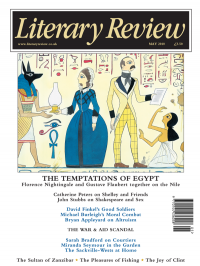Catherine Peters
Experiments In Living
Young Romantics: The Shelleys, Byron and Other Tangled Lives
By Daisy Hay
Bloomsbury 364pp £20
In her ambitious and enthralling first book, Daisy Hay takes the dynamics of friendship among the second-generation Romantics as her unifying theme. She explodes the myth of the isolated, autophagous poet, showing how these predominantly urban writers (scornfully dismissed by a destructive article in Blackwood's as 'the Cockney School', though they were not Cockneys and never a school) drew strength from each other for new and sometimes dangerous experiments in art and living. Hay sums up the importance of their association well: 'sociability – the self-conscious enactment of friendship – was transformed into a weapon in a battle for liberal survival.'
Hay's story begins in 1813 with the imprisonment of Leigh Hunt for writing and publishing seditious libel in The Examiner, the brilliant and wide-ranging journal he edited and his brother John published. Hunt was a privileged prisoner: his wife, Marianne, and children were able to join him in

Sign Up to our newsletter
Receive free articles, highlights from the archive, news, details of prizes, and much more.@Lit_Review
Follow Literary Review on Twitter
Twitter Feed
The Soviet Union might seem the last place that the art duo Gilbert & George would achieve success. Yet as the communist regime collapsed, that’s precisely what happened.
@StephenSmithWDS wonders how two East End gadflies infiltrated the Eastern Bloc.
Stephen Smith - From Russia with Lucre
Stephen Smith: From Russia with Lucre - Gilbert & George and the Communists by James Birch
literaryreview.co.uk
The dropping of the atomic bomb on Hiroshima in August 1945 has long been regarded as a historical watershed – but did it mark the start of a new era or the culmination of longer-term trends?
Philip Snow examines the question.
Philip Snow - Death from the Clouds
Philip Snow: Death from the Clouds - Rain of Ruin: Tokyo, Hiroshima, and the Surrender of Japan by Richard Overy
literaryreview.co.uk
Coleridge was fifty-four lines into ‘Kubla Khan’ before a knock on the door disturbed him. He blamed his unfinished poem on ‘a person on business from Porlock’.
Who was this arch-interrupter? Joanna Kavenna goes looking for the person from Porlock.
Joanna Kavenna - Do Not Disturb
Joanna Kavenna: Do Not Disturb
literaryreview.co.uk